Critical Analysis: Entrepreneurship Theory and Behavior
VerifiedAdded on 2023/01/19
|12
|3081
|61
Report
AI Summary
This report provides a comprehensive critical review of entrepreneurship theory, exploring various approaches and key themes. It examines the evolution of entrepreneurship theory, focusing on innovation, competition, and risk-taking behaviors. The report analyzes the strengths and weaknesses of existing research, highlighting the importance of understanding entrepreneurial behavior in the context of business development. It delves into the social and psychological approaches to entrepreneurship, as well as the composite approach, which considers cultural and social factors. The analysis covers innovation, competition aggressiveness, risk-taking, and proactiveness as crucial aspects of entrepreneurial behavior. The report assesses the historical consideration of innovativeness and identifies deficiencies in existing literature, such as failure to address key challenges and unstructured behavior. The strengths of the articles are also considered, with a focus on human behavior and business focus.
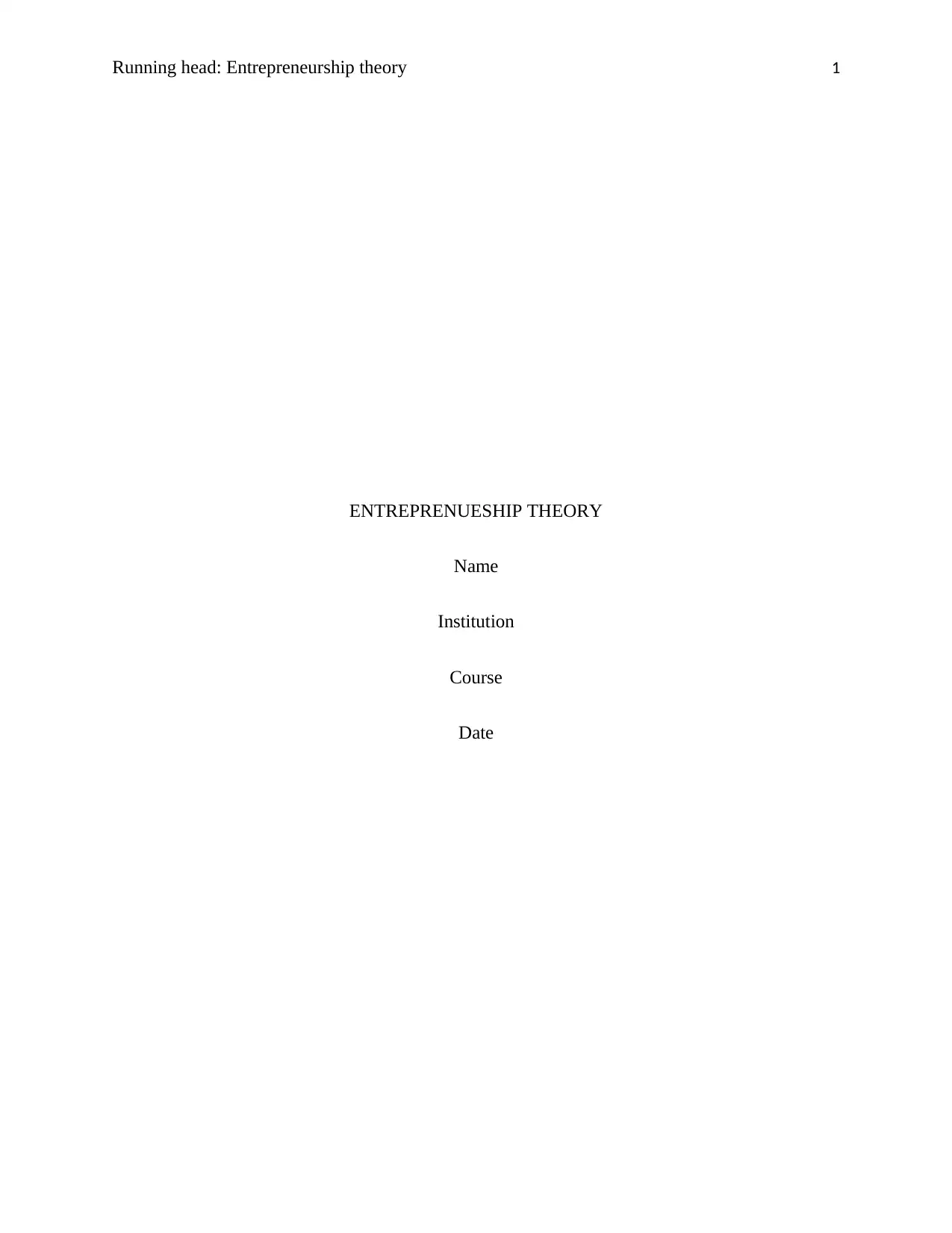
Running head: Entrepreneurship theory 1
ENTREPRENUESHIP THEORY
Name
Institution
Course
Date
ENTREPRENUESHIP THEORY
Name
Institution
Course
Date
Paraphrase This Document
Need a fresh take? Get an instant paraphrase of this document with our AI Paraphraser
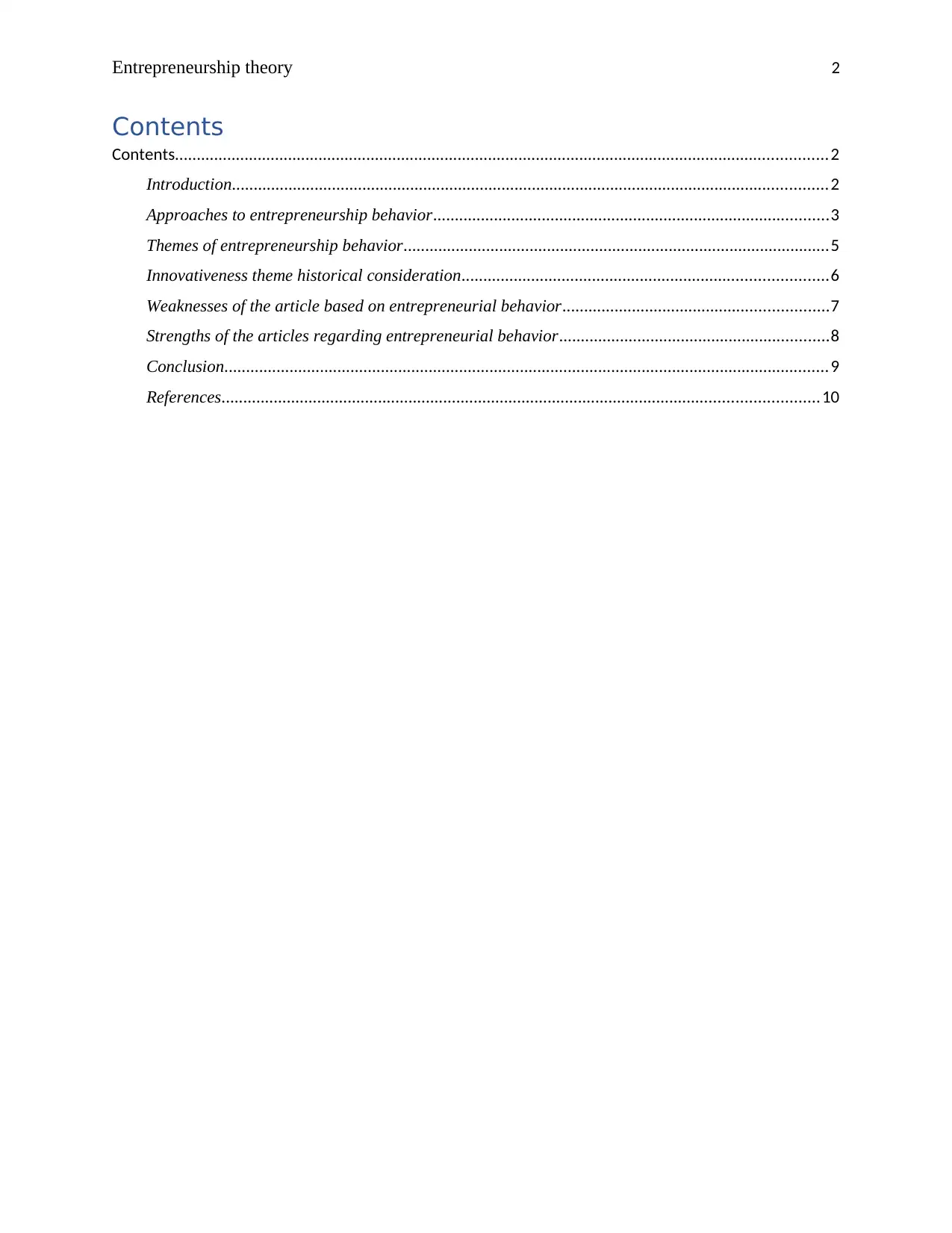
Entrepreneurship theory 2
Contents
Contents......................................................................................................................................................2
Introduction.........................................................................................................................................2
Approaches to entrepreneurship behavior...........................................................................................3
Themes of entrepreneurship behavior..................................................................................................5
Innovativeness theme historical consideration....................................................................................6
Weaknesses of the article based on entrepreneurial behavior.............................................................7
Strengths of the articles regarding entrepreneurial behavior..............................................................8
Conclusion...........................................................................................................................................9
References.........................................................................................................................................10
Contents
Contents......................................................................................................................................................2
Introduction.........................................................................................................................................2
Approaches to entrepreneurship behavior...........................................................................................3
Themes of entrepreneurship behavior..................................................................................................5
Innovativeness theme historical consideration....................................................................................6
Weaknesses of the article based on entrepreneurial behavior.............................................................7
Strengths of the articles regarding entrepreneurial behavior..............................................................8
Conclusion...........................................................................................................................................9
References.........................................................................................................................................10
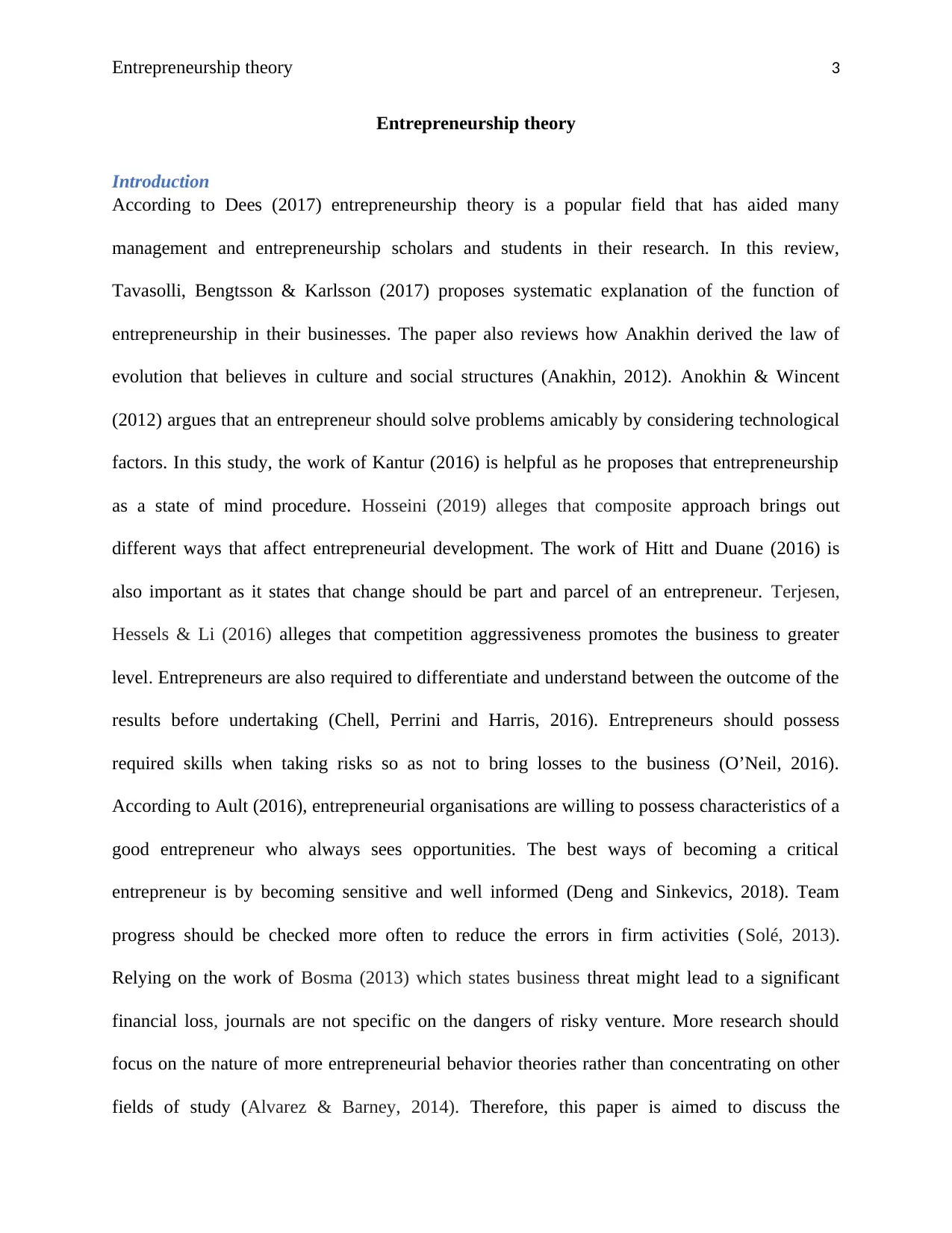
Entrepreneurship theory 3
Entrepreneurship theory
Introduction
According to Dees (2017) entrepreneurship theory is a popular field that has aided many
management and entrepreneurship scholars and students in their research. In this review,
Tavasolli, Bengtsson & Karlsson (2017) proposes systematic explanation of the function of
entrepreneurship in their businesses. The paper also reviews how Anakhin derived the law of
evolution that believes in culture and social structures (Anakhin, 2012). Anokhin & Wincent
(2012) argues that an entrepreneur should solve problems amicably by considering technological
factors. In this study, the work of Kantur (2016) is helpful as he proposes that entrepreneurship
as a state of mind procedure. Hosseini (2019) alleges that composite approach brings out
different ways that affect entrepreneurial development. The work of Hitt and Duane (2016) is
also important as it states that change should be part and parcel of an entrepreneur. Terjesen,
Hessels & Li (2016) alleges that competition aggressiveness promotes the business to greater
level. Entrepreneurs are also required to differentiate and understand between the outcome of the
results before undertaking (Chell, Perrini and Harris, 2016). Entrepreneurs should possess
required skills when taking risks so as not to bring losses to the business (O’Neil, 2016).
According to Ault (2016), entrepreneurial organisations are willing to possess characteristics of a
good entrepreneur who always sees opportunities. The best ways of becoming a critical
entrepreneur is by becoming sensitive and well informed (Deng and Sinkevics, 2018). Team
progress should be checked more often to reduce the errors in firm activities (Solé, 2013).
Relying on the work of Bosma (2013) which states business threat might lead to a significant
financial loss, journals are not specific on the dangers of risky venture. More research should
focus on the nature of more entrepreneurial behavior theories rather than concentrating on other
fields of study (Alvarez & Barney, 2014). Therefore, this paper is aimed to discuss the
Entrepreneurship theory
Introduction
According to Dees (2017) entrepreneurship theory is a popular field that has aided many
management and entrepreneurship scholars and students in their research. In this review,
Tavasolli, Bengtsson & Karlsson (2017) proposes systematic explanation of the function of
entrepreneurship in their businesses. The paper also reviews how Anakhin derived the law of
evolution that believes in culture and social structures (Anakhin, 2012). Anokhin & Wincent
(2012) argues that an entrepreneur should solve problems amicably by considering technological
factors. In this study, the work of Kantur (2016) is helpful as he proposes that entrepreneurship
as a state of mind procedure. Hosseini (2019) alleges that composite approach brings out
different ways that affect entrepreneurial development. The work of Hitt and Duane (2016) is
also important as it states that change should be part and parcel of an entrepreneur. Terjesen,
Hessels & Li (2016) alleges that competition aggressiveness promotes the business to greater
level. Entrepreneurs are also required to differentiate and understand between the outcome of the
results before undertaking (Chell, Perrini and Harris, 2016). Entrepreneurs should possess
required skills when taking risks so as not to bring losses to the business (O’Neil, 2016).
According to Ault (2016), entrepreneurial organisations are willing to possess characteristics of a
good entrepreneur who always sees opportunities. The best ways of becoming a critical
entrepreneur is by becoming sensitive and well informed (Deng and Sinkevics, 2018). Team
progress should be checked more often to reduce the errors in firm activities (Solé, 2013).
Relying on the work of Bosma (2013) which states business threat might lead to a significant
financial loss, journals are not specific on the dangers of risky venture. More research should
focus on the nature of more entrepreneurial behavior theories rather than concentrating on other
fields of study (Alvarez & Barney, 2014). Therefore, this paper is aimed to discuss the
⊘ This is a preview!⊘
Do you want full access?
Subscribe today to unlock all pages.

Trusted by 1+ million students worldwide
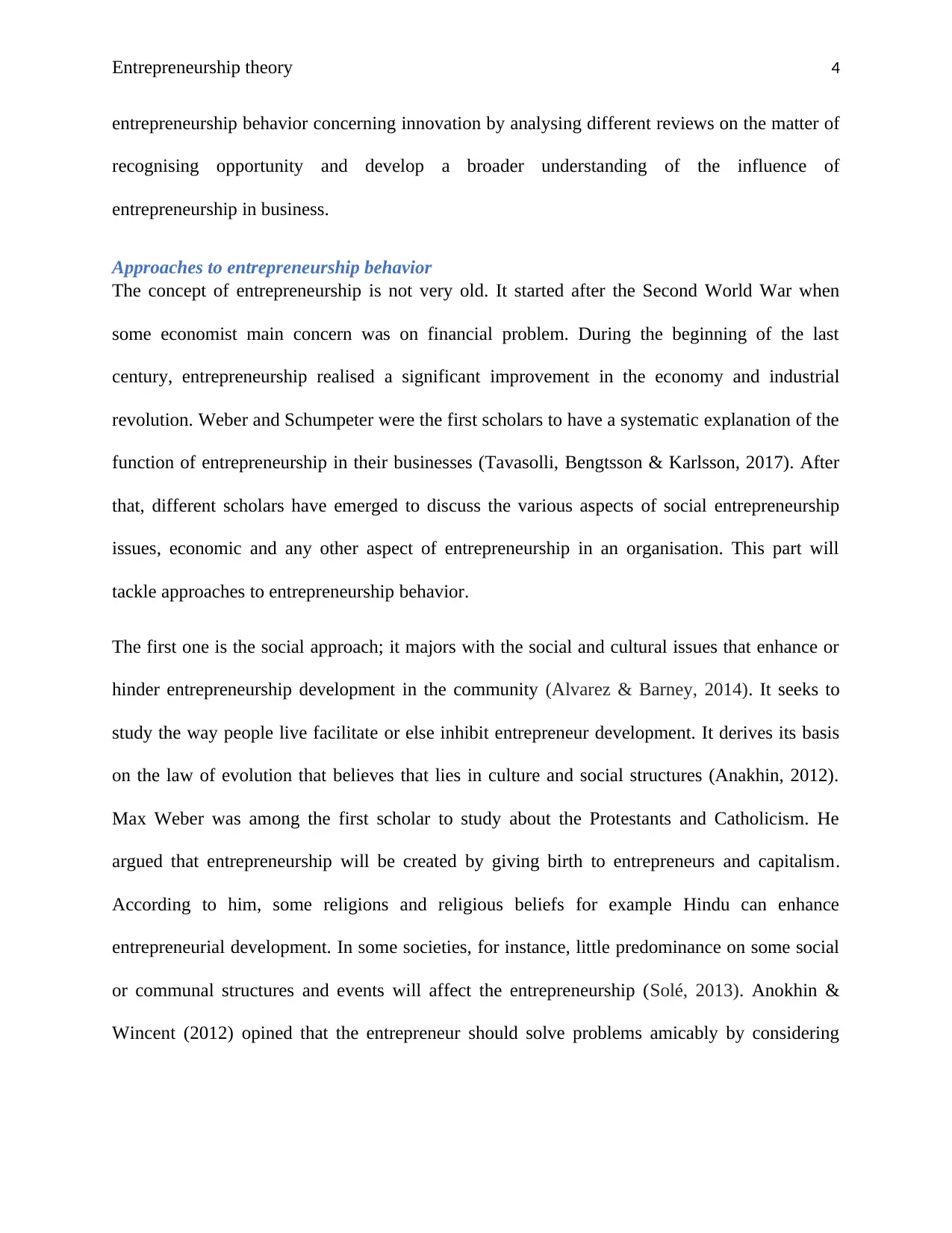
Entrepreneurship theory 4
entrepreneurship behavior concerning innovation by analysing different reviews on the matter of
recognising opportunity and develop a broader understanding of the influence of
entrepreneurship in business.
Approaches to entrepreneurship behavior
The concept of entrepreneurship is not very old. It started after the Second World War when
some economist main concern was on financial problem. During the beginning of the last
century, entrepreneurship realised a significant improvement in the economy and industrial
revolution. Weber and Schumpeter were the first scholars to have a systematic explanation of the
function of entrepreneurship in their businesses (Tavasolli, Bengtsson & Karlsson, 2017). After
that, different scholars have emerged to discuss the various aspects of social entrepreneurship
issues, economic and any other aspect of entrepreneurship in an organisation. This part will
tackle approaches to entrepreneurship behavior.
The first one is the social approach; it majors with the social and cultural issues that enhance or
hinder entrepreneurship development in the community (Alvarez & Barney, 2014). It seeks to
study the way people live facilitate or else inhibit entrepreneur development. It derives its basis
on the law of evolution that believes that lies in culture and social structures (Anakhin, 2012).
Max Weber was among the first scholar to study about the Protestants and Catholicism. He
argued that entrepreneurship will be created by giving birth to entrepreneurs and capitalism.
According to him, some religions and religious beliefs for example Hindu can enhance
entrepreneurial development. In some societies, for instance, little predominance on some social
or communal structures and events will affect the entrepreneurship (Solé, 2013). Anokhin &
Wincent (2012) opined that the entrepreneur should solve problems amicably by considering
entrepreneurship behavior concerning innovation by analysing different reviews on the matter of
recognising opportunity and develop a broader understanding of the influence of
entrepreneurship in business.
Approaches to entrepreneurship behavior
The concept of entrepreneurship is not very old. It started after the Second World War when
some economist main concern was on financial problem. During the beginning of the last
century, entrepreneurship realised a significant improvement in the economy and industrial
revolution. Weber and Schumpeter were the first scholars to have a systematic explanation of the
function of entrepreneurship in their businesses (Tavasolli, Bengtsson & Karlsson, 2017). After
that, different scholars have emerged to discuss the various aspects of social entrepreneurship
issues, economic and any other aspect of entrepreneurship in an organisation. This part will
tackle approaches to entrepreneurship behavior.
The first one is the social approach; it majors with the social and cultural issues that enhance or
hinder entrepreneurship development in the community (Alvarez & Barney, 2014). It seeks to
study the way people live facilitate or else inhibit entrepreneur development. It derives its basis
on the law of evolution that believes that lies in culture and social structures (Anakhin, 2012).
Max Weber was among the first scholar to study about the Protestants and Catholicism. He
argued that entrepreneurship will be created by giving birth to entrepreneurs and capitalism.
According to him, some religions and religious beliefs for example Hindu can enhance
entrepreneurial development. In some societies, for instance, little predominance on some social
or communal structures and events will affect the entrepreneurship (Solé, 2013). Anokhin &
Wincent (2012) opined that the entrepreneur should solve problems amicably by considering
Paraphrase This Document
Need a fresh take? Get an instant paraphrase of this document with our AI Paraphraser
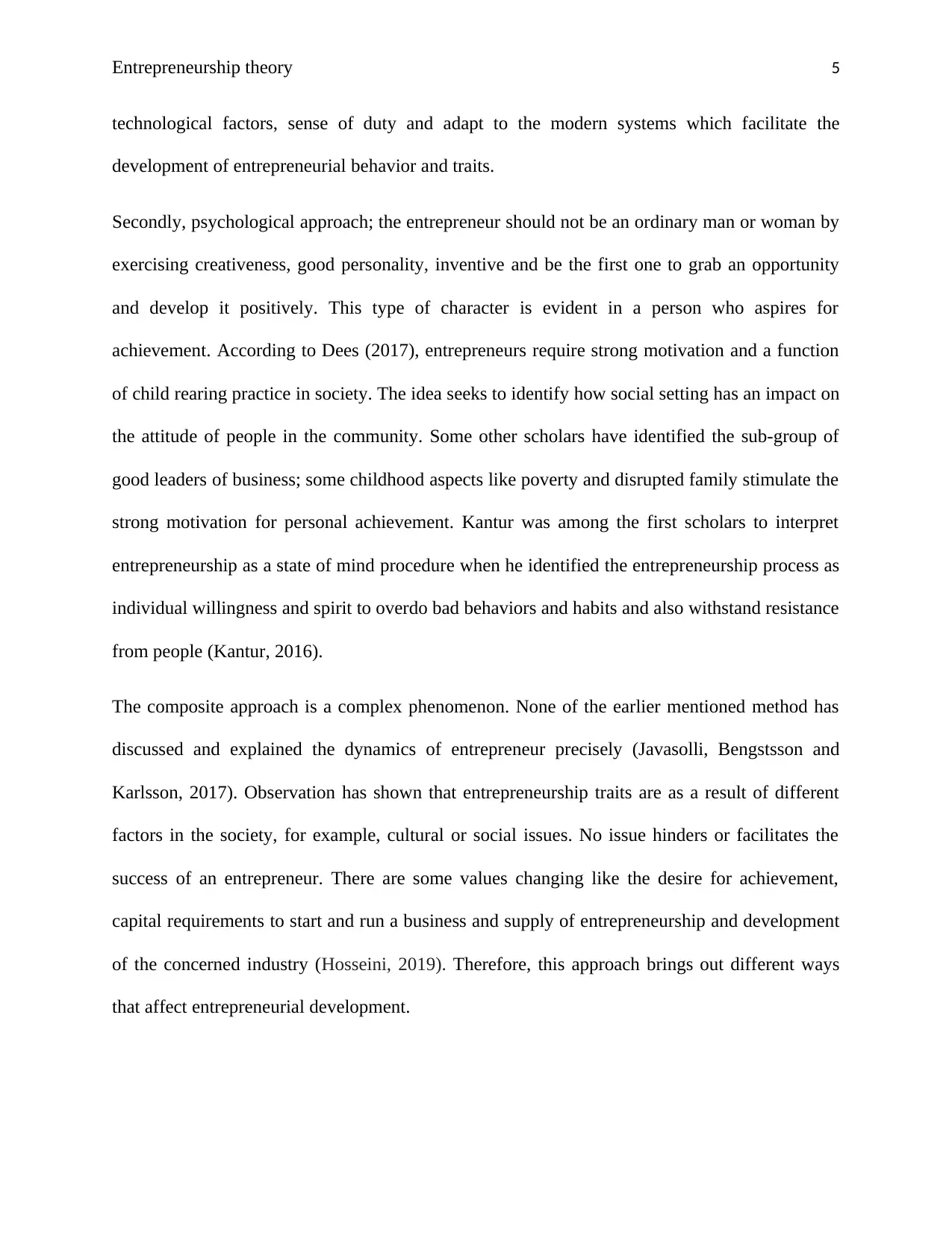
Entrepreneurship theory 5
technological factors, sense of duty and adapt to the modern systems which facilitate the
development of entrepreneurial behavior and traits.
Secondly, psychological approach; the entrepreneur should not be an ordinary man or woman by
exercising creativeness, good personality, inventive and be the first one to grab an opportunity
and develop it positively. This type of character is evident in a person who aspires for
achievement. According to Dees (2017), entrepreneurs require strong motivation and a function
of child rearing practice in society. The idea seeks to identify how social setting has an impact on
the attitude of people in the community. Some other scholars have identified the sub-group of
good leaders of business; some childhood aspects like poverty and disrupted family stimulate the
strong motivation for personal achievement. Kantur was among the first scholars to interpret
entrepreneurship as a state of mind procedure when he identified the entrepreneurship process as
individual willingness and spirit to overdo bad behaviors and habits and also withstand resistance
from people (Kantur, 2016).
The composite approach is a complex phenomenon. None of the earlier mentioned method has
discussed and explained the dynamics of entrepreneur precisely (Javasolli, Bengstsson and
Karlsson, 2017). Observation has shown that entrepreneurship traits are as a result of different
factors in the society, for example, cultural or social issues. No issue hinders or facilitates the
success of an entrepreneur. There are some values changing like the desire for achievement,
capital requirements to start and run a business and supply of entrepreneurship and development
of the concerned industry (Hosseini, 2019). Therefore, this approach brings out different ways
that affect entrepreneurial development.
technological factors, sense of duty and adapt to the modern systems which facilitate the
development of entrepreneurial behavior and traits.
Secondly, psychological approach; the entrepreneur should not be an ordinary man or woman by
exercising creativeness, good personality, inventive and be the first one to grab an opportunity
and develop it positively. This type of character is evident in a person who aspires for
achievement. According to Dees (2017), entrepreneurs require strong motivation and a function
of child rearing practice in society. The idea seeks to identify how social setting has an impact on
the attitude of people in the community. Some other scholars have identified the sub-group of
good leaders of business; some childhood aspects like poverty and disrupted family stimulate the
strong motivation for personal achievement. Kantur was among the first scholars to interpret
entrepreneurship as a state of mind procedure when he identified the entrepreneurship process as
individual willingness and spirit to overdo bad behaviors and habits and also withstand resistance
from people (Kantur, 2016).
The composite approach is a complex phenomenon. None of the earlier mentioned method has
discussed and explained the dynamics of entrepreneur precisely (Javasolli, Bengstsson and
Karlsson, 2017). Observation has shown that entrepreneurship traits are as a result of different
factors in the society, for example, cultural or social issues. No issue hinders or facilitates the
success of an entrepreneur. There are some values changing like the desire for achievement,
capital requirements to start and run a business and supply of entrepreneurship and development
of the concerned industry (Hosseini, 2019). Therefore, this approach brings out different ways
that affect entrepreneurial development.
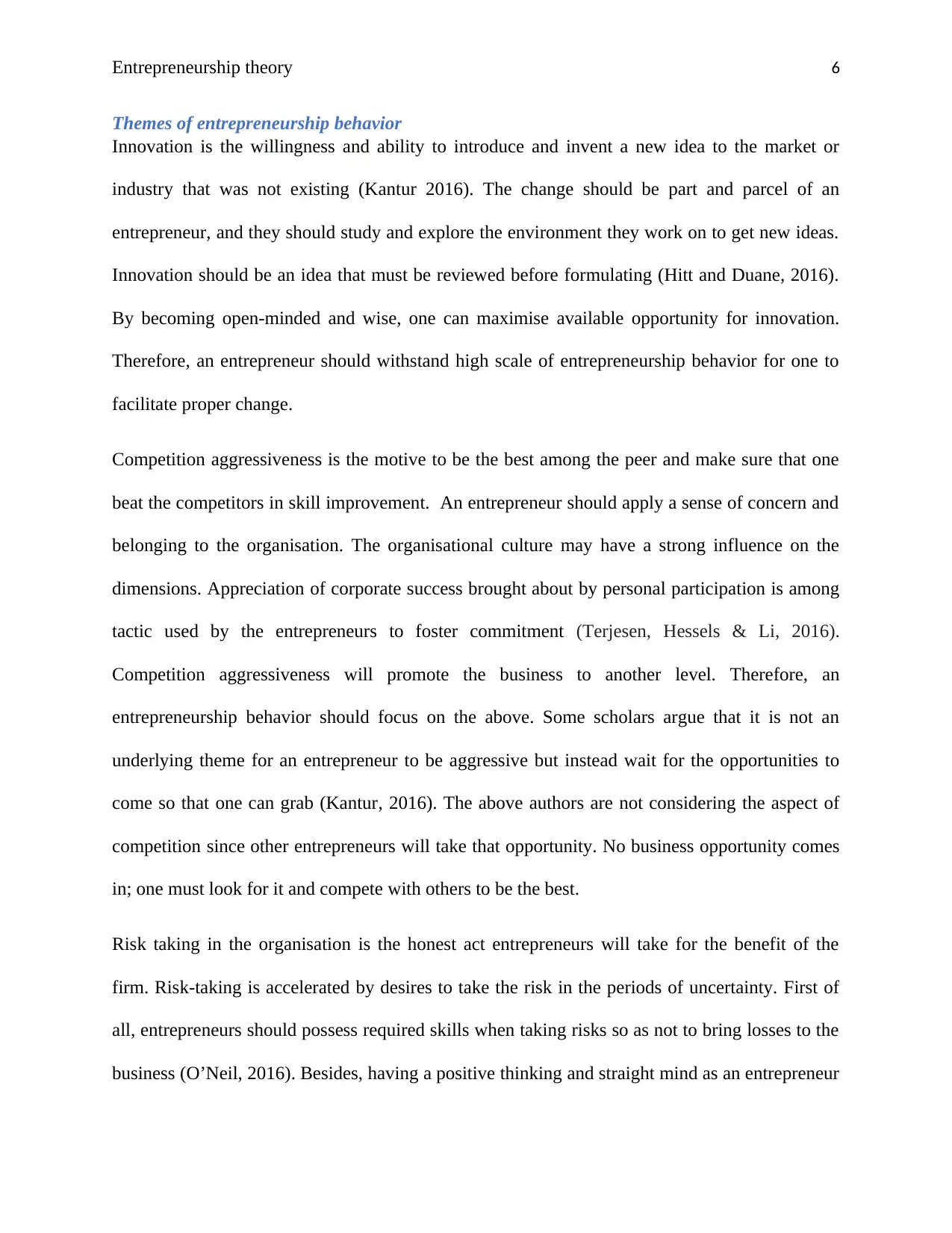
Entrepreneurship theory 6
Themes of entrepreneurship behavior
Innovation is the willingness and ability to introduce and invent a new idea to the market or
industry that was not existing (Kantur 2016). The change should be part and parcel of an
entrepreneur, and they should study and explore the environment they work on to get new ideas.
Innovation should be an idea that must be reviewed before formulating (Hitt and Duane, 2016).
By becoming open-minded and wise, one can maximise available opportunity for innovation.
Therefore, an entrepreneur should withstand high scale of entrepreneurship behavior for one to
facilitate proper change.
Competition aggressiveness is the motive to be the best among the peer and make sure that one
beat the competitors in skill improvement. An entrepreneur should apply a sense of concern and
belonging to the organisation. The organisational culture may have a strong influence on the
dimensions. Appreciation of corporate success brought about by personal participation is among
tactic used by the entrepreneurs to foster commitment (Terjesen, Hessels & Li, 2016).
Competition aggressiveness will promote the business to another level. Therefore, an
entrepreneurship behavior should focus on the above. Some scholars argue that it is not an
underlying theme for an entrepreneur to be aggressive but instead wait for the opportunities to
come so that one can grab (Kantur, 2016). The above authors are not considering the aspect of
competition since other entrepreneurs will take that opportunity. No business opportunity comes
in; one must look for it and compete with others to be the best.
Risk taking in the organisation is the honest act entrepreneurs will take for the benefit of the
firm. Risk-taking is accelerated by desires to take the risk in the periods of uncertainty. First of
all, entrepreneurs should possess required skills when taking risks so as not to bring losses to the
business (O’Neil, 2016). Besides, having a positive thinking and straight mind as an entrepreneur
Themes of entrepreneurship behavior
Innovation is the willingness and ability to introduce and invent a new idea to the market or
industry that was not existing (Kantur 2016). The change should be part and parcel of an
entrepreneur, and they should study and explore the environment they work on to get new ideas.
Innovation should be an idea that must be reviewed before formulating (Hitt and Duane, 2016).
By becoming open-minded and wise, one can maximise available opportunity for innovation.
Therefore, an entrepreneur should withstand high scale of entrepreneurship behavior for one to
facilitate proper change.
Competition aggressiveness is the motive to be the best among the peer and make sure that one
beat the competitors in skill improvement. An entrepreneur should apply a sense of concern and
belonging to the organisation. The organisational culture may have a strong influence on the
dimensions. Appreciation of corporate success brought about by personal participation is among
tactic used by the entrepreneurs to foster commitment (Terjesen, Hessels & Li, 2016).
Competition aggressiveness will promote the business to another level. Therefore, an
entrepreneurship behavior should focus on the above. Some scholars argue that it is not an
underlying theme for an entrepreneur to be aggressive but instead wait for the opportunities to
come so that one can grab (Kantur, 2016). The above authors are not considering the aspect of
competition since other entrepreneurs will take that opportunity. No business opportunity comes
in; one must look for it and compete with others to be the best.
Risk taking in the organisation is the honest act entrepreneurs will take for the benefit of the
firm. Risk-taking is accelerated by desires to take the risk in the periods of uncertainty. First of
all, entrepreneurs should possess required skills when taking risks so as not to bring losses to the
business (O’Neil, 2016). Besides, having a positive thinking and straight mind as an entrepreneur
⊘ This is a preview!⊘
Do you want full access?
Subscribe today to unlock all pages.

Trusted by 1+ million students worldwide
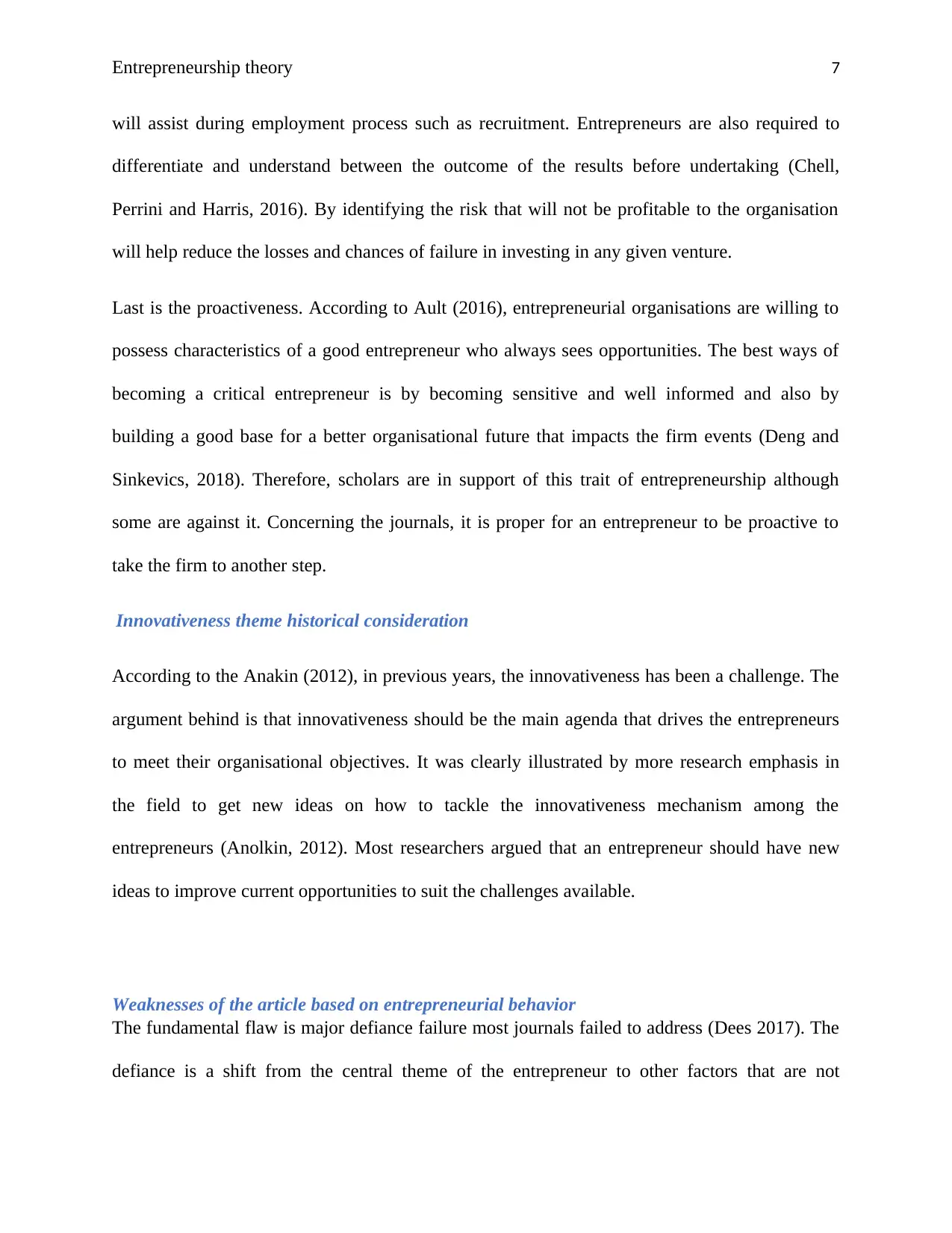
Entrepreneurship theory 7
will assist during employment process such as recruitment. Entrepreneurs are also required to
differentiate and understand between the outcome of the results before undertaking (Chell,
Perrini and Harris, 2016). By identifying the risk that will not be profitable to the organisation
will help reduce the losses and chances of failure in investing in any given venture.
Last is the proactiveness. According to Ault (2016), entrepreneurial organisations are willing to
possess characteristics of a good entrepreneur who always sees opportunities. The best ways of
becoming a critical entrepreneur is by becoming sensitive and well informed and also by
building a good base for a better organisational future that impacts the firm events (Deng and
Sinkevics, 2018). Therefore, scholars are in support of this trait of entrepreneurship although
some are against it. Concerning the journals, it is proper for an entrepreneur to be proactive to
take the firm to another step.
Innovativeness theme historical consideration
According to the Anakin (2012), in previous years, the innovativeness has been a challenge. The
argument behind is that innovativeness should be the main agenda that drives the entrepreneurs
to meet their organisational objectives. It was clearly illustrated by more research emphasis in
the field to get new ideas on how to tackle the innovativeness mechanism among the
entrepreneurs (Anolkin, 2012). Most researchers argued that an entrepreneur should have new
ideas to improve current opportunities to suit the challenges available.
Weaknesses of the article based on entrepreneurial behavior
The fundamental flaw is major defiance failure most journals failed to address (Dees 2017). The
defiance is a shift from the central theme of the entrepreneur to other factors that are not
will assist during employment process such as recruitment. Entrepreneurs are also required to
differentiate and understand between the outcome of the results before undertaking (Chell,
Perrini and Harris, 2016). By identifying the risk that will not be profitable to the organisation
will help reduce the losses and chances of failure in investing in any given venture.
Last is the proactiveness. According to Ault (2016), entrepreneurial organisations are willing to
possess characteristics of a good entrepreneur who always sees opportunities. The best ways of
becoming a critical entrepreneur is by becoming sensitive and well informed and also by
building a good base for a better organisational future that impacts the firm events (Deng and
Sinkevics, 2018). Therefore, scholars are in support of this trait of entrepreneurship although
some are against it. Concerning the journals, it is proper for an entrepreneur to be proactive to
take the firm to another step.
Innovativeness theme historical consideration
According to the Anakin (2012), in previous years, the innovativeness has been a challenge. The
argument behind is that innovativeness should be the main agenda that drives the entrepreneurs
to meet their organisational objectives. It was clearly illustrated by more research emphasis in
the field to get new ideas on how to tackle the innovativeness mechanism among the
entrepreneurs (Anolkin, 2012). Most researchers argued that an entrepreneur should have new
ideas to improve current opportunities to suit the challenges available.
Weaknesses of the article based on entrepreneurial behavior
The fundamental flaw is major defiance failure most journals failed to address (Dees 2017). The
defiance is a shift from the central theme of the entrepreneur to other factors that are not
Paraphrase This Document
Need a fresh take? Get an instant paraphrase of this document with our AI Paraphraser
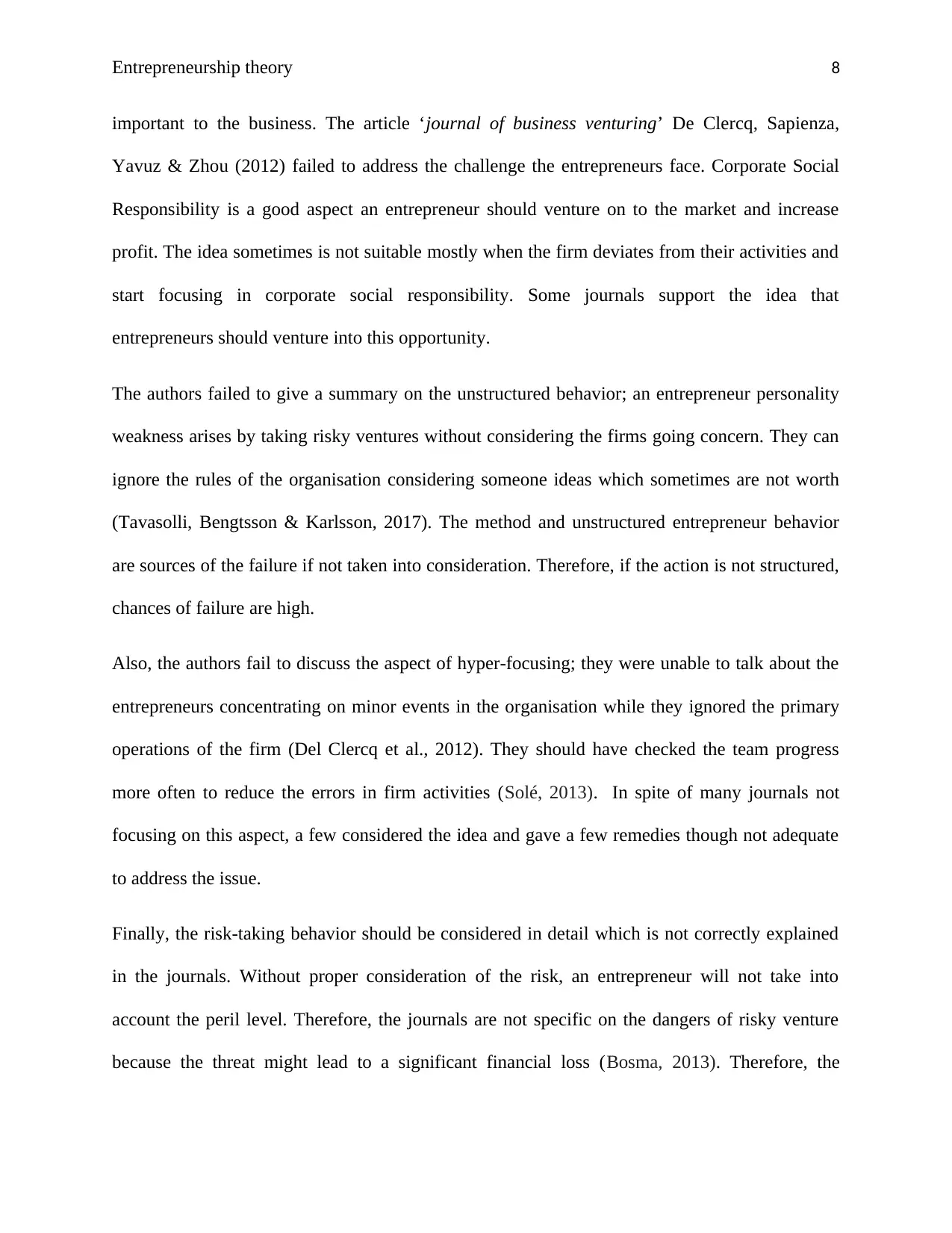
Entrepreneurship theory 8
important to the business. The article ‘journal of business venturing’ De Clercq, Sapienza,
Yavuz & Zhou (2012) failed to address the challenge the entrepreneurs face. Corporate Social
Responsibility is a good aspect an entrepreneur should venture on to the market and increase
profit. The idea sometimes is not suitable mostly when the firm deviates from their activities and
start focusing in corporate social responsibility. Some journals support the idea that
entrepreneurs should venture into this opportunity.
The authors failed to give a summary on the unstructured behavior; an entrepreneur personality
weakness arises by taking risky ventures without considering the firms going concern. They can
ignore the rules of the organisation considering someone ideas which sometimes are not worth
(Tavasolli, Bengtsson & Karlsson, 2017). The method and unstructured entrepreneur behavior
are sources of the failure if not taken into consideration. Therefore, if the action is not structured,
chances of failure are high.
Also, the authors fail to discuss the aspect of hyper-focusing; they were unable to talk about the
entrepreneurs concentrating on minor events in the organisation while they ignored the primary
operations of the firm (Del Clercq et al., 2012). They should have checked the team progress
more often to reduce the errors in firm activities (Solé, 2013). In spite of many journals not
focusing on this aspect, a few considered the idea and gave a few remedies though not adequate
to address the issue.
Finally, the risk-taking behavior should be considered in detail which is not correctly explained
in the journals. Without proper consideration of the risk, an entrepreneur will not take into
account the peril level. Therefore, the journals are not specific on the dangers of risky venture
because the threat might lead to a significant financial loss (Bosma, 2013). Therefore, the
important to the business. The article ‘journal of business venturing’ De Clercq, Sapienza,
Yavuz & Zhou (2012) failed to address the challenge the entrepreneurs face. Corporate Social
Responsibility is a good aspect an entrepreneur should venture on to the market and increase
profit. The idea sometimes is not suitable mostly when the firm deviates from their activities and
start focusing in corporate social responsibility. Some journals support the idea that
entrepreneurs should venture into this opportunity.
The authors failed to give a summary on the unstructured behavior; an entrepreneur personality
weakness arises by taking risky ventures without considering the firms going concern. They can
ignore the rules of the organisation considering someone ideas which sometimes are not worth
(Tavasolli, Bengtsson & Karlsson, 2017). The method and unstructured entrepreneur behavior
are sources of the failure if not taken into consideration. Therefore, if the action is not structured,
chances of failure are high.
Also, the authors fail to discuss the aspect of hyper-focusing; they were unable to talk about the
entrepreneurs concentrating on minor events in the organisation while they ignored the primary
operations of the firm (Del Clercq et al., 2012). They should have checked the team progress
more often to reduce the errors in firm activities (Solé, 2013). In spite of many journals not
focusing on this aspect, a few considered the idea and gave a few remedies though not adequate
to address the issue.
Finally, the risk-taking behavior should be considered in detail which is not correctly explained
in the journals. Without proper consideration of the risk, an entrepreneur will not take into
account the peril level. Therefore, the journals are not specific on the dangers of risky venture
because the threat might lead to a significant financial loss (Bosma, 2013). Therefore, the
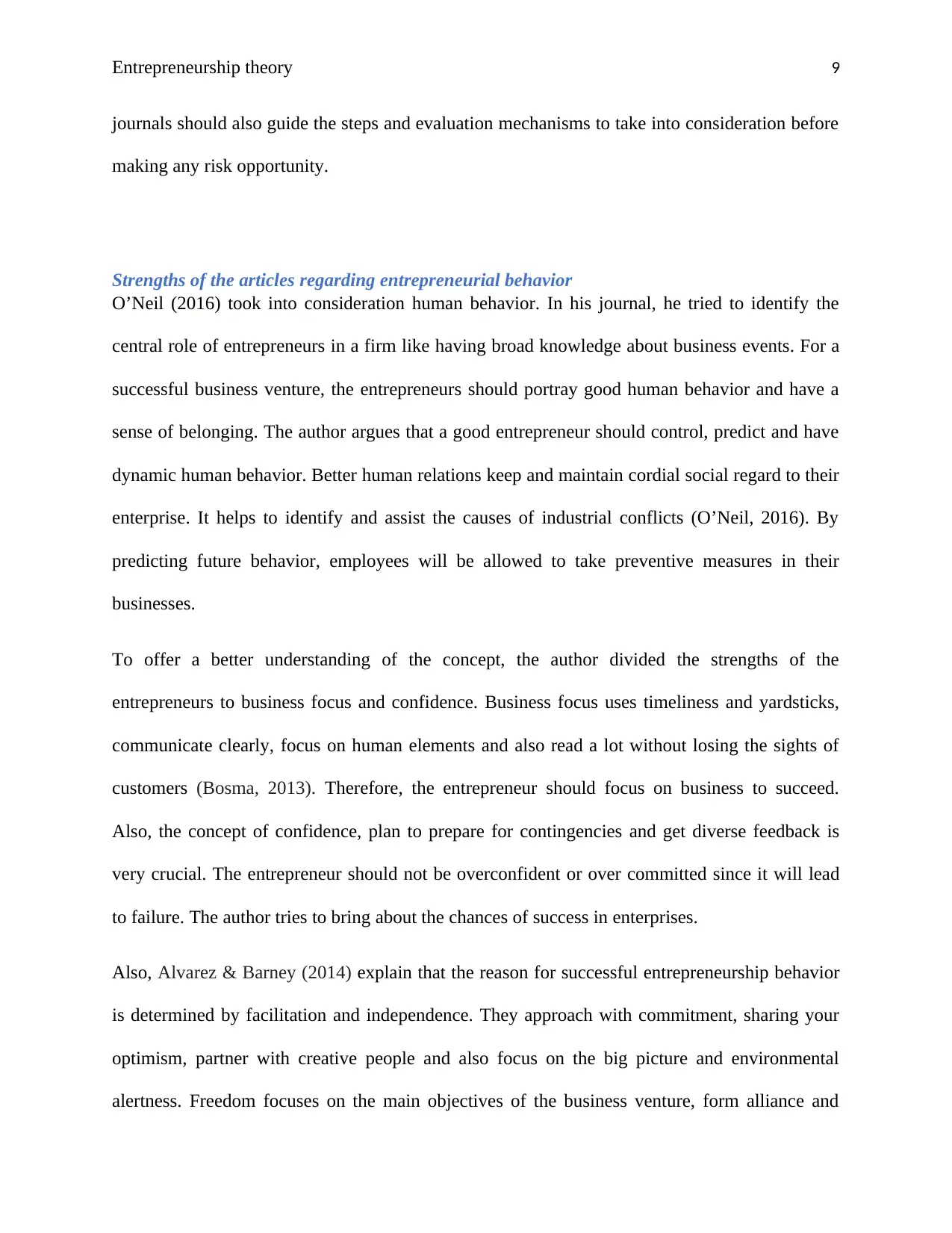
Entrepreneurship theory 9
journals should also guide the steps and evaluation mechanisms to take into consideration before
making any risk opportunity.
Strengths of the articles regarding entrepreneurial behavior
O’Neil (2016) took into consideration human behavior. In his journal, he tried to identify the
central role of entrepreneurs in a firm like having broad knowledge about business events. For a
successful business venture, the entrepreneurs should portray good human behavior and have a
sense of belonging. The author argues that a good entrepreneur should control, predict and have
dynamic human behavior. Better human relations keep and maintain cordial social regard to their
enterprise. It helps to identify and assist the causes of industrial conflicts (O’Neil, 2016). By
predicting future behavior, employees will be allowed to take preventive measures in their
businesses.
To offer a better understanding of the concept, the author divided the strengths of the
entrepreneurs to business focus and confidence. Business focus uses timeliness and yardsticks,
communicate clearly, focus on human elements and also read a lot without losing the sights of
customers (Bosma, 2013). Therefore, the entrepreneur should focus on business to succeed.
Also, the concept of confidence, plan to prepare for contingencies and get diverse feedback is
very crucial. The entrepreneur should not be overconfident or over committed since it will lead
to failure. The author tries to bring about the chances of success in enterprises.
Also, Alvarez & Barney (2014) explain that the reason for successful entrepreneurship behavior
is determined by facilitation and independence. They approach with commitment, sharing your
optimism, partner with creative people and also focus on the big picture and environmental
alertness. Freedom focuses on the main objectives of the business venture, form alliance and
journals should also guide the steps and evaluation mechanisms to take into consideration before
making any risk opportunity.
Strengths of the articles regarding entrepreneurial behavior
O’Neil (2016) took into consideration human behavior. In his journal, he tried to identify the
central role of entrepreneurs in a firm like having broad knowledge about business events. For a
successful business venture, the entrepreneurs should portray good human behavior and have a
sense of belonging. The author argues that a good entrepreneur should control, predict and have
dynamic human behavior. Better human relations keep and maintain cordial social regard to their
enterprise. It helps to identify and assist the causes of industrial conflicts (O’Neil, 2016). By
predicting future behavior, employees will be allowed to take preventive measures in their
businesses.
To offer a better understanding of the concept, the author divided the strengths of the
entrepreneurs to business focus and confidence. Business focus uses timeliness and yardsticks,
communicate clearly, focus on human elements and also read a lot without losing the sights of
customers (Bosma, 2013). Therefore, the entrepreneur should focus on business to succeed.
Also, the concept of confidence, plan to prepare for contingencies and get diverse feedback is
very crucial. The entrepreneur should not be overconfident or over committed since it will lead
to failure. The author tries to bring about the chances of success in enterprises.
Also, Alvarez & Barney (2014) explain that the reason for successful entrepreneurship behavior
is determined by facilitation and independence. They approach with commitment, sharing your
optimism, partner with creative people and also focus on the big picture and environmental
alertness. Freedom focuses on the main objectives of the business venture, form alliance and
⊘ This is a preview!⊘
Do you want full access?
Subscribe today to unlock all pages.

Trusted by 1+ million students worldwide
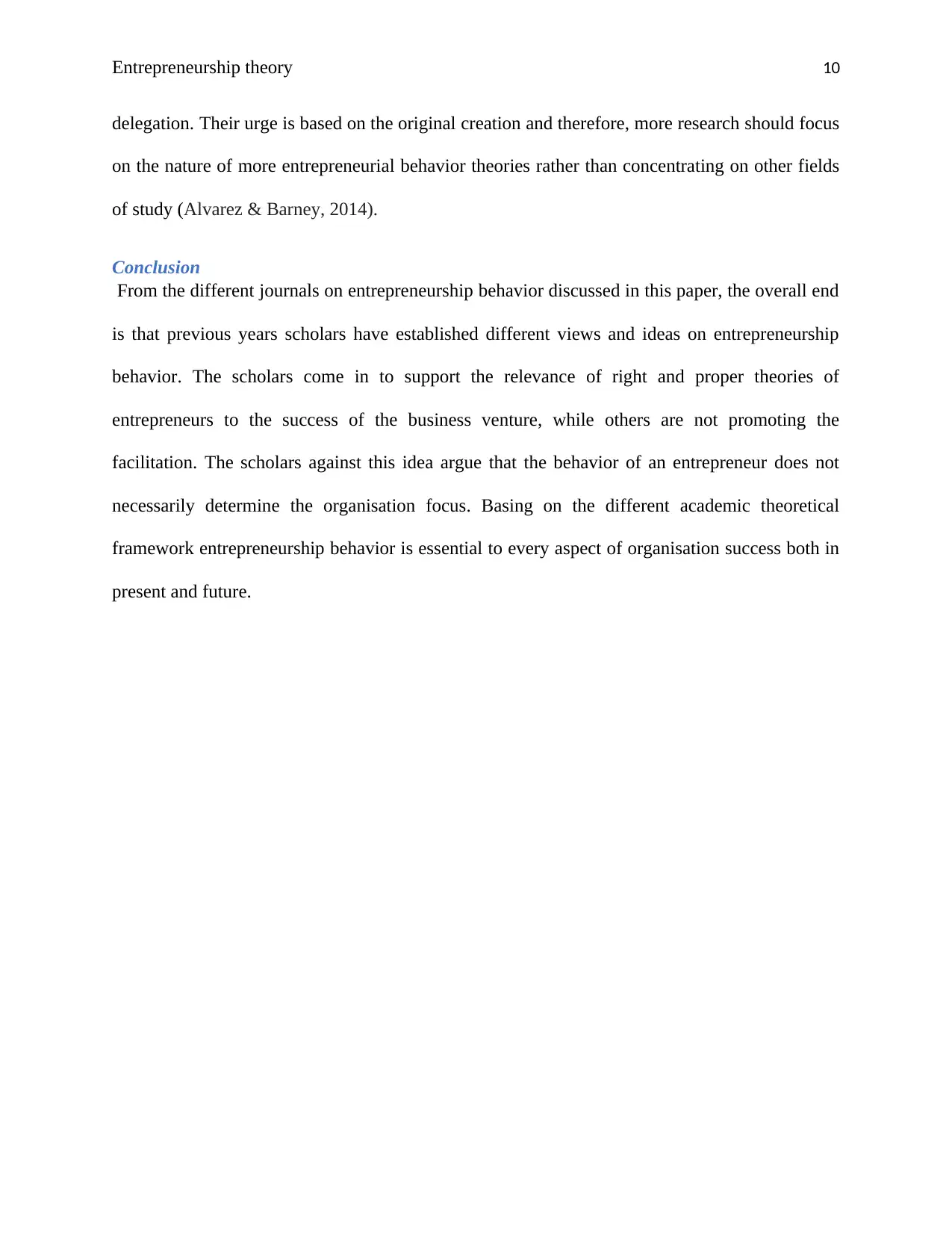
Entrepreneurship theory 10
delegation. Their urge is based on the original creation and therefore, more research should focus
on the nature of more entrepreneurial behavior theories rather than concentrating on other fields
of study (Alvarez & Barney, 2014).
Conclusion
From the different journals on entrepreneurship behavior discussed in this paper, the overall end
is that previous years scholars have established different views and ideas on entrepreneurship
behavior. The scholars come in to support the relevance of right and proper theories of
entrepreneurs to the success of the business venture, while others are not promoting the
facilitation. The scholars against this idea argue that the behavior of an entrepreneur does not
necessarily determine the organisation focus. Basing on the different academic theoretical
framework entrepreneurship behavior is essential to every aspect of organisation success both in
present and future.
delegation. Their urge is based on the original creation and therefore, more research should focus
on the nature of more entrepreneurial behavior theories rather than concentrating on other fields
of study (Alvarez & Barney, 2014).
Conclusion
From the different journals on entrepreneurship behavior discussed in this paper, the overall end
is that previous years scholars have established different views and ideas on entrepreneurship
behavior. The scholars come in to support the relevance of right and proper theories of
entrepreneurs to the success of the business venture, while others are not promoting the
facilitation. The scholars against this idea argue that the behavior of an entrepreneur does not
necessarily determine the organisation focus. Basing on the different academic theoretical
framework entrepreneurship behavior is essential to every aspect of organisation success both in
present and future.
Paraphrase This Document
Need a fresh take? Get an instant paraphrase of this document with our AI Paraphraser
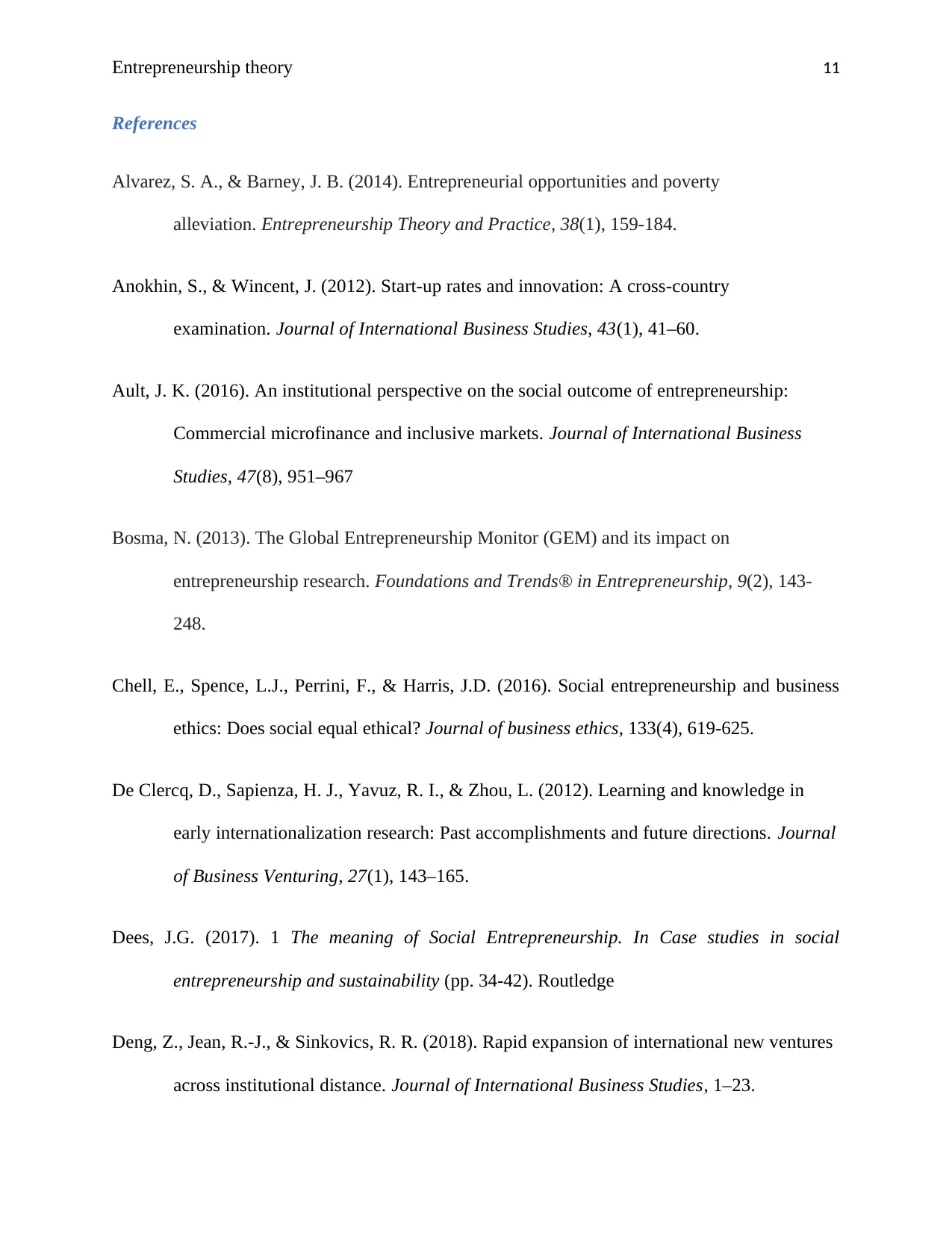
Entrepreneurship theory 11
References
Alvarez, S. A., & Barney, J. B. (2014). Entrepreneurial opportunities and poverty
alleviation. Entrepreneurship Theory and Practice, 38(1), 159-184.
Anokhin, S., & Wincent, J. (2012). Start-up rates and innovation: A cross-country
examination. Journal of International Business Studies, 43(1), 41–60.
Ault, J. K. (2016). An institutional perspective on the social outcome of entrepreneurship:
Commercial microfinance and inclusive markets. Journal of International Business
Studies, 47(8), 951–967
Bosma, N. (2013). The Global Entrepreneurship Monitor (GEM) and its impact on
entrepreneurship research. Foundations and Trends® in Entrepreneurship, 9(2), 143-
248.
Chell, E., Spence, L.J., Perrini, F., & Harris, J.D. (2016). Social entrepreneurship and business
ethics: Does social equal ethical? Journal of business ethics, 133(4), 619-625.
De Clercq, D., Sapienza, H. J., Yavuz, R. I., & Zhou, L. (2012). Learning and knowledge in
early internationalization research: Past accomplishments and future directions. Journal
of Business Venturing, 27(1), 143–165.
Dees, J.G. (2017). 1 The meaning of Social Entrepreneurship. In Case studies in social
entrepreneurship and sustainability (pp. 34-42). Routledge
Deng, Z., Jean, R.-J., & Sinkovics, R. R. (2018). Rapid expansion of international new ventures
across institutional distance. Journal of International Business Studies, 1–23.
References
Alvarez, S. A., & Barney, J. B. (2014). Entrepreneurial opportunities and poverty
alleviation. Entrepreneurship Theory and Practice, 38(1), 159-184.
Anokhin, S., & Wincent, J. (2012). Start-up rates and innovation: A cross-country
examination. Journal of International Business Studies, 43(1), 41–60.
Ault, J. K. (2016). An institutional perspective on the social outcome of entrepreneurship:
Commercial microfinance and inclusive markets. Journal of International Business
Studies, 47(8), 951–967
Bosma, N. (2013). The Global Entrepreneurship Monitor (GEM) and its impact on
entrepreneurship research. Foundations and Trends® in Entrepreneurship, 9(2), 143-
248.
Chell, E., Spence, L.J., Perrini, F., & Harris, J.D. (2016). Social entrepreneurship and business
ethics: Does social equal ethical? Journal of business ethics, 133(4), 619-625.
De Clercq, D., Sapienza, H. J., Yavuz, R. I., & Zhou, L. (2012). Learning and knowledge in
early internationalization research: Past accomplishments and future directions. Journal
of Business Venturing, 27(1), 143–165.
Dees, J.G. (2017). 1 The meaning of Social Entrepreneurship. In Case studies in social
entrepreneurship and sustainability (pp. 34-42). Routledge
Deng, Z., Jean, R.-J., & Sinkovics, R. R. (2018). Rapid expansion of international new ventures
across institutional distance. Journal of International Business Studies, 1–23.
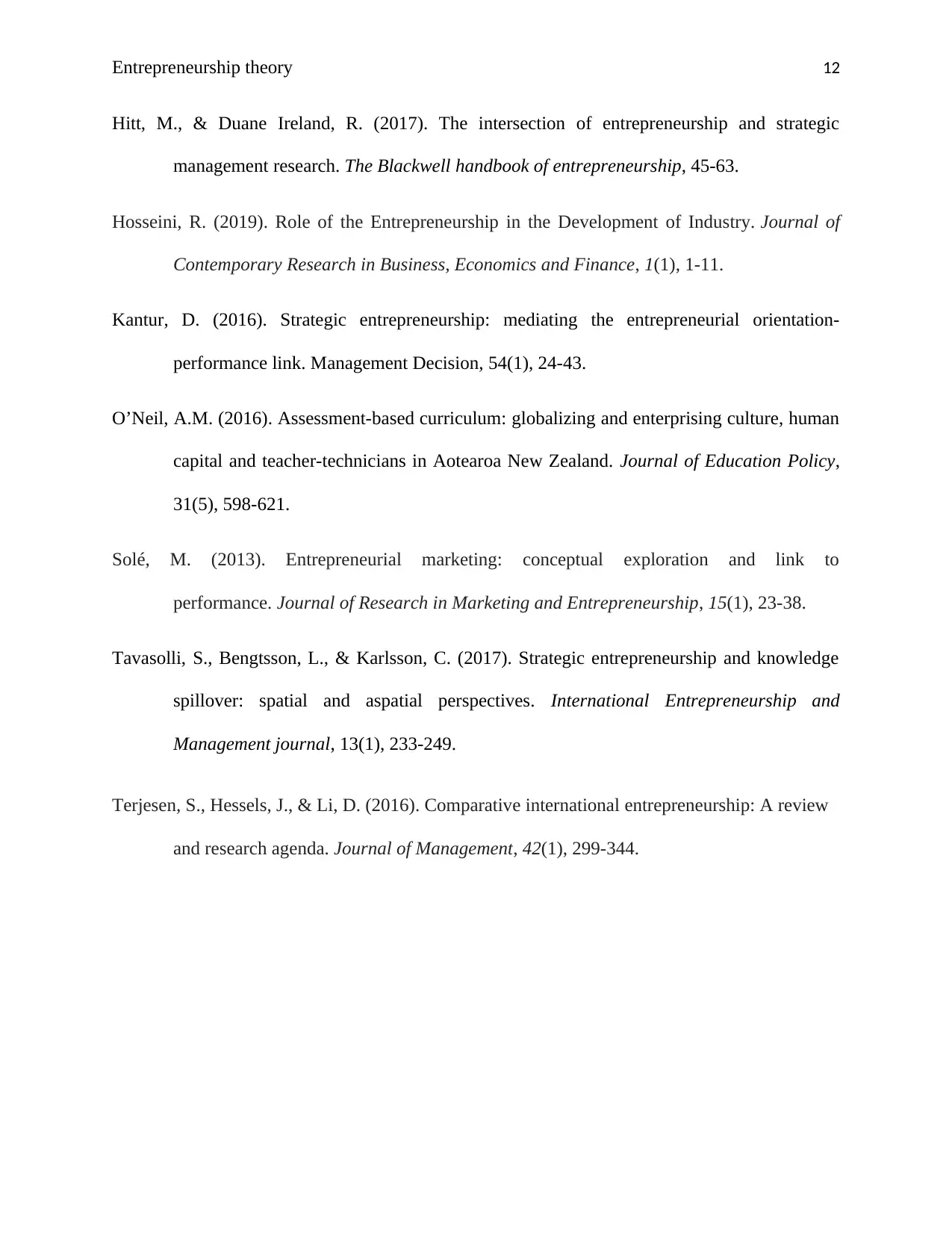
Entrepreneurship theory 12
Hitt, M., & Duane Ireland, R. (2017). The intersection of entrepreneurship and strategic
management research. The Blackwell handbook of entrepreneurship, 45-63.
Hosseini, R. (2019). Role of the Entrepreneurship in the Development of Industry. Journal of
Contemporary Research in Business, Economics and Finance, 1(1), 1-11.
Kantur, D. (2016). Strategic entrepreneurship: mediating the entrepreneurial orientation-
performance link. Management Decision, 54(1), 24-43.
O’Neil, A.M. (2016). Assessment-based curriculum: globalizing and enterprising culture, human
capital and teacher-technicians in Aotearoa New Zealand. Journal of Education Policy,
31(5), 598-621.
Solé, M. (2013). Entrepreneurial marketing: conceptual exploration and link to
performance. Journal of Research in Marketing and Entrepreneurship, 15(1), 23-38.
Tavasolli, S., Bengtsson, L., & Karlsson, C. (2017). Strategic entrepreneurship and knowledge
spillover: spatial and aspatial perspectives. International Entrepreneurship and
Management journal, 13(1), 233-249.
Terjesen, S., Hessels, J., & Li, D. (2016). Comparative international entrepreneurship: A review
and research agenda. Journal of Management, 42(1), 299-344.
Hitt, M., & Duane Ireland, R. (2017). The intersection of entrepreneurship and strategic
management research. The Blackwell handbook of entrepreneurship, 45-63.
Hosseini, R. (2019). Role of the Entrepreneurship in the Development of Industry. Journal of
Contemporary Research in Business, Economics and Finance, 1(1), 1-11.
Kantur, D. (2016). Strategic entrepreneurship: mediating the entrepreneurial orientation-
performance link. Management Decision, 54(1), 24-43.
O’Neil, A.M. (2016). Assessment-based curriculum: globalizing and enterprising culture, human
capital and teacher-technicians in Aotearoa New Zealand. Journal of Education Policy,
31(5), 598-621.
Solé, M. (2013). Entrepreneurial marketing: conceptual exploration and link to
performance. Journal of Research in Marketing and Entrepreneurship, 15(1), 23-38.
Tavasolli, S., Bengtsson, L., & Karlsson, C. (2017). Strategic entrepreneurship and knowledge
spillover: spatial and aspatial perspectives. International Entrepreneurship and
Management journal, 13(1), 233-249.
Terjesen, S., Hessels, J., & Li, D. (2016). Comparative international entrepreneurship: A review
and research agenda. Journal of Management, 42(1), 299-344.
⊘ This is a preview!⊘
Do you want full access?
Subscribe today to unlock all pages.

Trusted by 1+ million students worldwide
1 out of 12
Related Documents
Your All-in-One AI-Powered Toolkit for Academic Success.
+13062052269
info@desklib.com
Available 24*7 on WhatsApp / Email
![[object Object]](/_next/static/media/star-bottom.7253800d.svg)
Unlock your academic potential
Copyright © 2020–2026 A2Z Services. All Rights Reserved. Developed and managed by ZUCOL.



